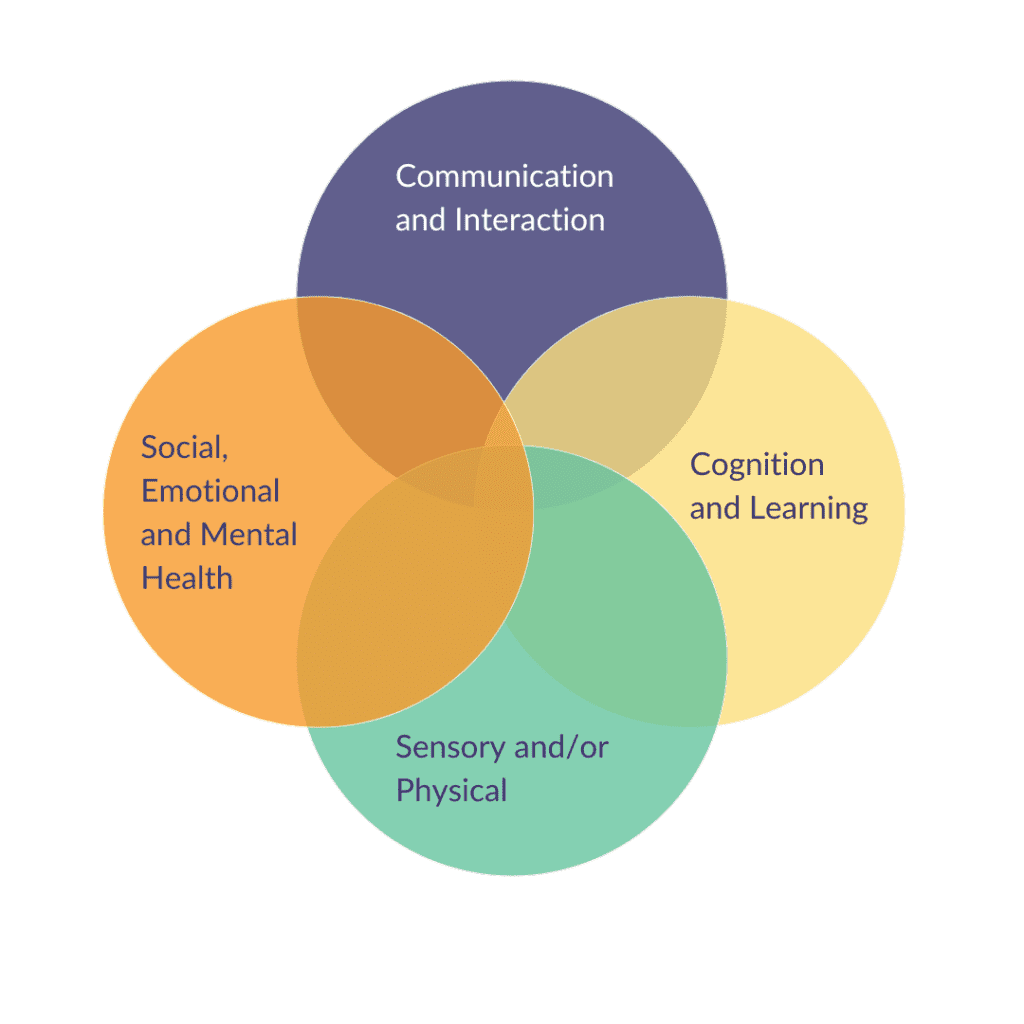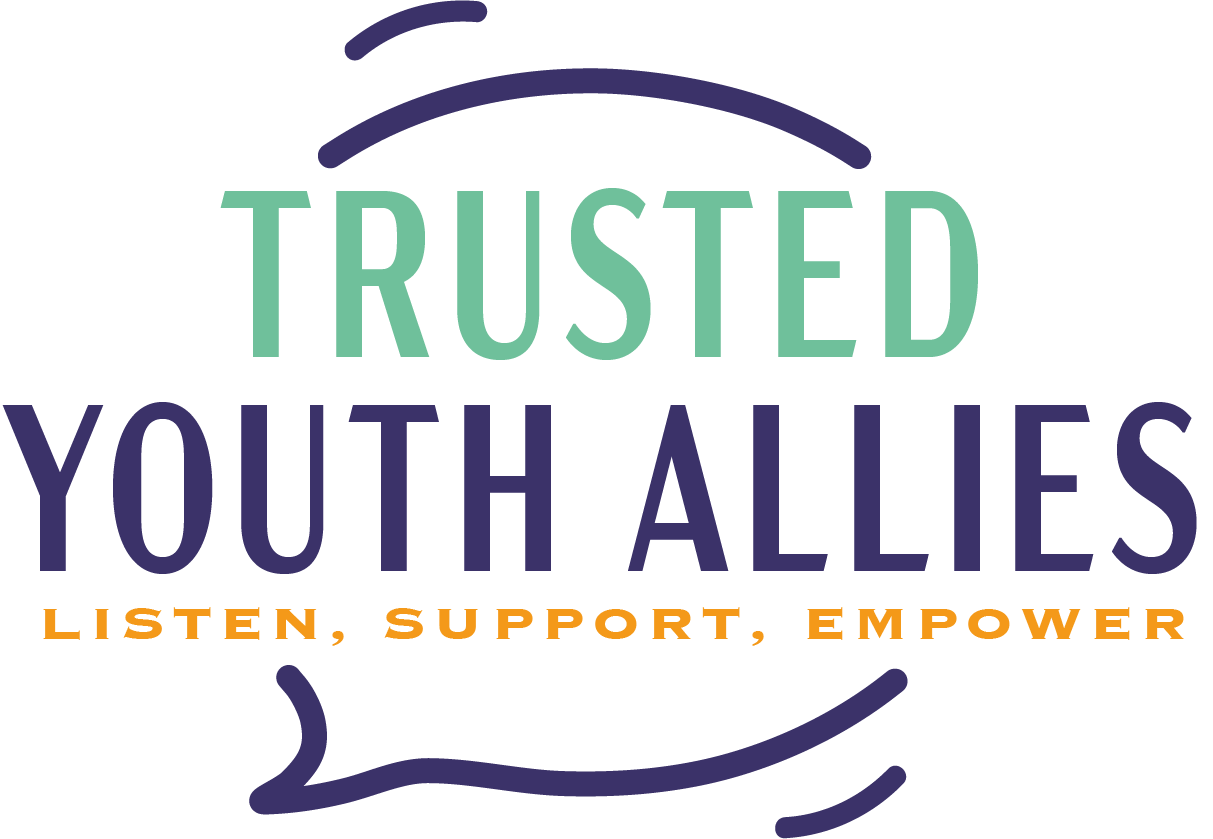Introduction
Supporting young people with Special Educational Needs and Disabilities (SEND) who have been victims of crime or victimisation requires understanding, patience, and tailoring your approach to their needs. This resource aims to guide parents and trusted adults in effectively supporting these young people.
1. Understanding SEND
There are four broad areas of special educational needs that you must keep in mind when supporting young people with SEND. These are:

Familiarise yourself with the needs and challenges of the young people you support. Each young person with SEND is unique, and their responses to crime or victimisation may vary. Therefore, it is essential to understand their unique communication styles, sensory sensitivities, and potential barriers to accessing support so you can tailor your approach to meet their individual needs and preferences.
When assisting a young person, especially one with a learning disability or autism, communication may be challenging as they could be distressed and nonverbal. Speak clearly and calmly, allowing them extra time to process information. Inquire about trusted contacts and keep them informed of the situation, letting them know what is happening and why.
2. Creating a Safe Environment
- Building Trust: Create a safe and trusting environment where young people feel comfortable expressing their feelings and experiences. Engaging in casual conversation concerning their surroundings can help alleviate tension and build trust. Encourage open communication and active listening without judgment. Talk to them regularly, and not just about crime. Doing so will ensure they know they can trust you and will make them feel they can approach you to talk.
- Establishing Boundaries: Respect the boundaries and preferences of the young people you support, for instance, by not touching them without permission. Provide opportunities for them to assert their autonomy and make choices about their safety and well-being.
3. Providing Emotional Support
- Validation: Validate the feelings and experiences of young people with SEND without minimising or dismissing their concerns. Offer empathy, understanding, and reassurance throughout the recovery process.
- Empowerment: Encourage the young people you support to advocate for themselves and participate in decision-making processes related to their support and care. Promote their rights to accessibility, dignity, and inclusion in all aspects of life.
- Identifying Distress: Expressions of distress are a way of venting frustration at the environment and inability to communicate. Learn to recognise signs of distress, which may include making noises or movements to block out the world, losing the ability to speak, or being visibly frustrated. These behaviours may be characterised as meltdowns (aggressive) or shutdowns (becoming withdrawn).
- Responding to Distress: Understand that these responses are not attempts to seek attention or misbehave but ways the body may react to protect itself. Allow young people to safely shut out the world and offer reassurance by removing items that could cause harm and providing them with a quiet place to recover without asking lots of questions or imposing punishments.
4. Accessing Support Services
- Information and Referrals: Provide information about available support services, such as counselling, therapy, peer support groups, websites, and helplines. Assist the young people you support in accessing appropriate services and making informed decisions about their care. The Trusted Youth Allies website has resources for young people, which you can find here. At the bottom of this page, you can find other support services for young people that you can share.
- Collaboration: Work together with professionals such as teachers, therapists, and support staff to ensure that young people with SEND who have been victims of crime receive comprehensive and coordinated support. This may involve sharing important information and actively working as a team to meet the individual needs of these young people in the most effective way possible.
- Helping to make a report: When making a report about the crime, support young people in understanding the process and assist them in navigating the reporting procedures. Write a clear, simple plan about what you will do to help them and what they need to do. You may want to read the EasyRead Victims’ Code with the young people you support, which you can find here.
5. Remembering to look after yourself
- Self-Reflection: When supporting young victims of crime, reflect on your own emotions, biases, and reactions. Practice self-awareness and seek support from other trusted adults or professionals when needed.
- Self-Care Practices: Prioritise self-care practices to maintain your well-being and resilience. Engage in activities that recharge and rejuvenate you, such as hobbies you enjoy, exercise, mindfulness, and reaching out to your support network. Remembering to look after yourself and creating healthy boundaries is vital in ensuring you avoid becoming burnt out. Burnout can happen when someone feels emotionally drained and overwhelmed from too much stress, usually from work or other responsibilities.
Supporting SEND young people who are victims of crime requires patience, empathy, and a commitment to understanding their unique needs and experiences. By creating a safe and inclusive environment, providing emotional support, facilitating access to services, and practising self-care, parents and trusted adults can empower young people with SEND to heal and thrive in the aftermath of victimisation. Remember, your support and advocacy can make a significant difference in the lives of young people with SEND as they navigate their journey toward recovery and resilience.
Further Resources
EasyRead Victims’ Code is a simplified guide to the Code of Practice for Victims of Crime. The Victims’ Code outlines what should happen from when a crime is reported to the police until after the trial. This guide presents this information in an easy-to-understand format.
Contact is a support charity for families with disabled children. They provide guidance and advice on benefits, education, health and social care services. Contact also offers a free listening ear service, providing one-to-one telephone appointments with a family support adviser.
Respond is a national charity providing therapy and specialist support services to people with learning disabilities, autism or both who have experienced abuse, violence, or trauma.
Stay Safe East is run by and for disabled adults. They provide advocacy and support services to survivors of domestic abuse, sexual violence, hate crime, harassment and other forms of abuse and serve communities in London.
Victim Support is an independent charity dedicated to helping individuals affected by crime and traumatic incidents. Their services are available 24/7, year-round, offering free and confidential support to anyone impacted by crime or traumatic events, regardless of whether the crime was reported to the police or when it occurred.
Call Supportline on 08 08 16 89 111
The Mix provides one-to-one chat and messenger services, discussion boards and information for young people.
Kooth is an anonymous site that helps children and young people feel safe and confident when exploring their concerns and seeking professional support.
Young Minds is a mental health charity for children, young people and their parents, ensuring all young people can get the mental health support they need.
Mind provides advice and support to empower anyone experiencing a mental health problem. They campaign to improve services, raise awareness, and promote understanding.
InfoLine: 0300 123 3393
The Mind InfoLine can help you find specialist services in your area.

